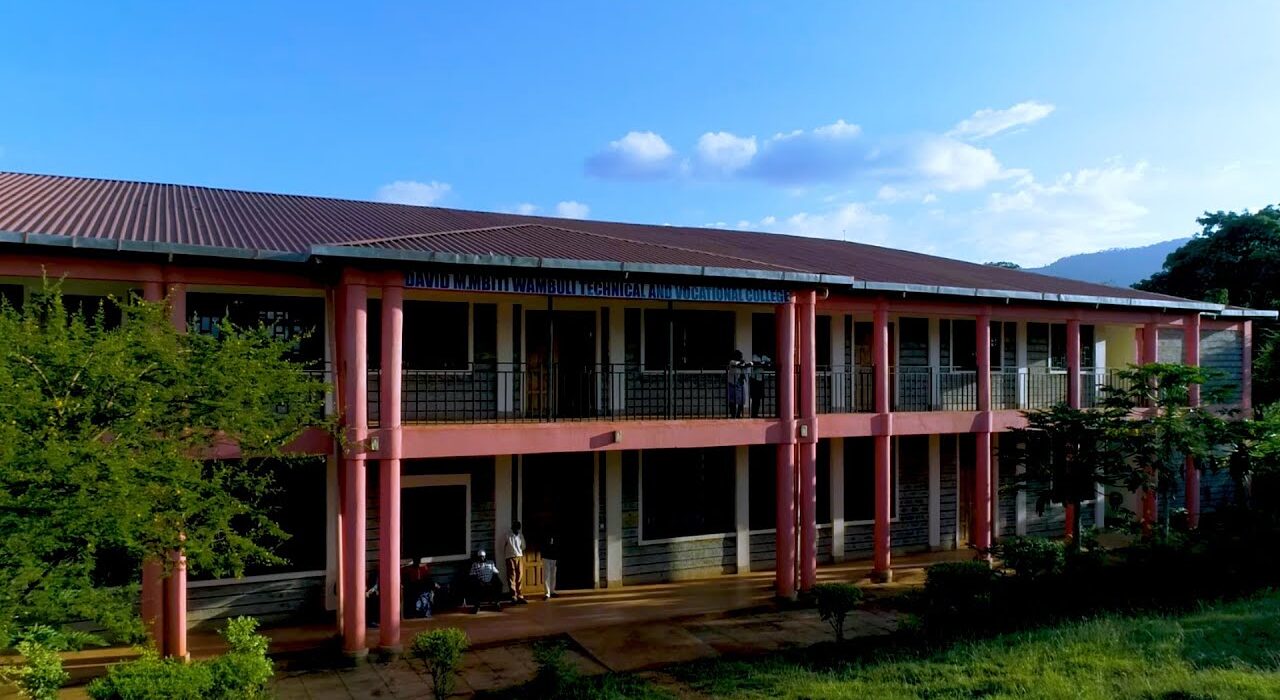David M Wambuli Technical Vocational College (DMWTVC) in Makueni County, Kenya, stands as a vital institution within the country’s Technical and Vocational Education and Training (TVET) framework, offering practical, career-oriented programs to empower students with skills for the modern workforce. As a government TVET institution under the Ministry of Education, regulated by the Technical and Vocational Education and Training Authority (TVETA), DMWTVC plays a significant role in addressing Kenya’s skills gap. With 72% of jobs in Kenya projected to require postsecondary education or training by 2031, according to a 2023 Georgetown University Center on Education and the Workforce analysis, TVET institutions like David M Wambuli are essential for preparing students for employment. For Kenyan students, parents, and the Kenyan diaspora seeking educational opportunities, understanding the full list of David M Wambuli Technical Vocational College courses for 2025/2026 is crucial for making informed career decisions.
Why Choose David M Wambuli Technical Vocational College?
David M Wambuli Technical Vocational College, located in Wambuli village, Mbooni West Sub-County, Makueni County, is a government TVET institution established to increase access to vocational training and support Kenya’s Vision 2030 industrialization goals. The college, which opened its doors in September 2018, is situated 15 km from Machakos town along the Muvuti – Kali – Kikima route, 1.5 km from Mulaani market, and occupies 5 acres of flat terrain. Initially admitting students for Electrical and Electronics Engineering, the college has since expanded its offerings to include a wide range of programs across various departments.
DMWTVC is managed by a Board of Governors (BOG) appointed by the Cabinet Secretary, as stipulated by the TVET Act of 2013. The college’s mandate is to provide Technical, Vocational Education and Training with a strong emphasis on entrepreneurship for self-reliance and national development. Its programs are designed in collaboration with industry partners to meet labor market demands, offering students a direct pathway to employment or further education. With courses at artisan, certificate, and diploma levels, DMWTVC caters to students with diverse academic backgrounds, from KCPE to KCSE graduates.
How We Compiled the List of David M Wambuli Technical Vocational College Courses
To create this comprehensive list, we utilized the provided programme data for the 2025/2026 cycle, supplemented by insights from the broader TVET landscape in Kenya. We also drew on information from similar institutions and national training objectives outlined by TVETA. Our methodology includes:
- Programme Relevance: We prioritized courses that align with Kenya’s labor market demands, such as ICT, engineering, and agriculture.
- Level of Study: We included artisan, certificate, and diploma courses to cater to a wide range of students.
- Industry Demand: We considered sectors with high employment potential in Kenya, such as technology, electrical engineering, and business.
- Accessibility: We ensured the list reflects programs accessible to students with varying academic qualifications, from KCPE to KCSE graduates.
Full List of David M Wambuli Technical Vocational College Courses for 2025/2026
Below is the full list of David M Wambuli Technical Vocational College courses and programmes on offer for the 2025/2026 cycle, categorized by department and level of study. These programs are designed to equip students with practical skills for immediate employment or further education.
1. Department of Electrical and Electronics Engineering
The Electrical and Electronics Engineering Department at DMWTVC is one of the college’s foundational departments, reflecting its initial focus when it opened in 2018. These programs support Kenya’s energy and infrastructure sectors.
- Diploma in Electrical & Electronic Engineering (Telecommunication Option)
- Programme Code: 3720717
- Duration: 3 years
- Entry Requirements: KCSE mean grade C- (minus)
- Overview: Covers telecommunication systems, electronic circuits, and signal processing.
- Career Prospects: Telecom engineer, electronics technician, network specialist.
- Average Salary: KES 40,000–70,000 per month.
- Diploma in Electrical Engineering (Power Option) Level 6
- Programme Code: 3720F45
- Duration: 2 years
- Entry Requirements: KCSE mean grade C- (minus)
- Overview: Focuses on power generation, distribution, and electrical systems maintenance.
- Career Prospects: Power plant technician, electrical engineer, maintenance supervisor.
- Average Salary: KES 45,000–80,000 per month.
- Certificate in Electrical and Electronic Technology (Telecommunication Option)
- Programme Code: 3720832
- Duration: 1 year
- Entry Requirements: KCSE mean grade D (plain)
- Overview: Teaches foundational skills in telecommunication systems and electronics repair.
- Career Prospects: Telecom technician, electronics assistant, field service technician.
- Average Salary: KES 20,000–35,000 per month.
- Electrical Installation – Level 5 (CBET)
- Programme Code: 3720818
- Duration: 1 year
- Entry Requirements: KCSE mean grade D (plain)
- Overview: Covers electrical installation, wiring, and safety practices under the Competency-Based Education and Training (CBET) framework.
- Career Prospects: Electrician, installation technician, maintenance worker.
- Average Salary: KES 25,000–40,000 per month.
- Electrical Operation Level 5 (CDACC)
- Programme Code: 3720820
- Duration: 1 year
- Entry Requirements: KCSE mean grade D (plain)
- Overview: Focuses on operating and maintaining electrical systems, aligned with the Curriculum Development, Assessment and Certification Council (CDACC).
- Career Prospects: Electrical operator, maintenance technician, power systems assistant.
- Average Salary: KES 25,000–40,000 per month.
- Solar PV Installation Level 5
- Programme Code: 3720F97
- Duration: 1 year
- Entry Requirements: KCSE mean grade D (plain)
- Overview: Teaches solar photovoltaic system installation, maintenance, and troubleshooting.
- Career Prospects: Solar technician, renewable energy specialist, installation expert.
- Average Salary: KES 25,000–40,000 per month.
- Artisan in Electrical Installation
- Programme Code: 3720A21
- Duration: 6 months
- Entry Requirements: KCPE or equivalent
- Overview: Introduces basic electrical installation and safety practices.
- Career Prospects: Electrician apprentice, maintenance worker.
- Average Salary: KES 15,000–25,000 per month.
- Electrical Installation Level 4 (CDACC)
- Programme Code: 3720A41
- Duration: 6 months
- Entry Requirements: KCPE or equivalent
- Overview: Provides foundational skills in electrical installation under the CDACC framework.
- Career Prospects: Electrician, installation assistant.
- Average Salary: KES 15,000–25,000 per month.
2. Department of Information and Communication Technology (ICT)
ICT is a cornerstone of Kenya’s digital economy, contributing 9.2% to GDP in 2023, according to the Kenya National Bureau of Statistics. DMWTVC offers ICT courses to meet this demand.
- Diploma in Information Communication Technology
- Programme Code: 3720758
- Duration: 2 years
- Entry Requirements: KCSE mean grade C- (minus)
- Overview: Covers programming, network administration, and system maintenance.
- Career Prospects: ICT technician, network administrator, IT support specialist.
- Average Salary: KES 30,000–50,000 per month.
- Computer Science Level 6
- Programme Code: 3720715
- Duration: 2 years
- Entry Requirements: KCSE mean grade C- (minus)
- Overview: Focuses on software development, algorithms, and computer systems.
- Career Prospects: Software developer, systems analyst, IT consultant.
- Average Salary: KES 40,000–70,000 per month.
- ICT Technician Level 6 (CBET)
- Programme Code: 3720853
- Duration: 2 years
- Entry Requirements: KCSE mean grade C- (minus)
- Overview: Teaches advanced ICT skills, including cybersecurity and software development, under the CBET framework.
- Career Prospects: ICT technician, systems analyst, IT consultant.
- Average Salary: KES 35,000–60,000 per month.
- ICT Technician Level 5
- Programme Code: 3720801
- Duration: 1 year
- Entry Requirements: KCSE mean grade D (plain)
- Overview: Focuses on intermediate ICT skills, including hardware maintenance and networking.
- Career Prospects: IT assistant, network technician, computer operator.
- Average Salary: KES 25,000–40,000 per month.
- Certificate in Information Technology
- Programme Code: 3720891
- Duration: 1 year
- Entry Requirements: KCSE mean grade D (plain)
- Overview: Introduces basic computer applications, internet skills, and troubleshooting.
- Career Prospects: Data entry clerk, IT assistant, computer operator.
- Average Salary: KES 20,000–35,000 per month.
3. Department of Business and Entrepreneurship
Business courses at DMWTVC prepare students for Kenya’s vibrant SME sector, which accounts for 33% of GDP, according to the Kenya Institute for Public Policy Research and Analysis (KIPPRA).
- Diploma in Accountancy
- Programme Code: 3720601
- Duration: 2 years
- Entry Requirements: KCSE mean grade C- (minus)
- Overview: Covers financial accounting, auditing, and taxation.
- Career Prospects: Accountant, auditor, financial analyst.
- Average Salary: KES 35,000–60,000 per month.
- Diploma in Human Resource Management
- Programme Code: 3720755
- Duration: 2 years
- Entry Requirements: KCSE mean grade C- (minus)
- Overview: Teaches recruitment, employee training, and labor relations.
- Career Prospects: HR officer, recruitment specialist, employee relations manager.
- Average Salary: KES 35,000–60,000 per month.
- Human Resource Management Level 6
- Programme Code: 3720C37
- Duration: 2 years
- Entry Requirements: KCSE mean grade C- (minus)
- Overview: Focuses on advanced HR practices, including strategic management and organizational development.
- Career Prospects: HR manager, talent acquisition specialist, HR consultant.
- Average Salary: KES 40,000–70,000 per month.
- Human Resource Management Level 5
- Programme Code: 3720F59
- Duration: 1 year
- Entry Requirements: KCSE mean grade D (plain)
- Overview: Covers foundational HR skills, including payroll management and employee relations.
- Career Prospects: HR assistant, payroll officer, recruitment coordinator.
- Average Salary: KES 25,000–40,000 per month.
- Level 6 Supply Chain Management
- Programme Code: 3720875
- Duration: 2 years
- Entry Requirements: KCSE mean grade C- (minus)
- Overview: Focuses on logistics, procurement, and inventory management.
- Career Prospects: Supply chain manager, logistics officer, procurement specialist.
- Average Salary: KES 35,000–60,000 per month.
- Craft in Supply Chain Management
- Programme Code: 3720957
- Duration: 1 year
- Entry Requirements: KCSE mean grade D (plain)
- Overview: Teaches procurement, logistics, and inventory control.
- Career Prospects: Logistics assistant, storekeeper, procurement clerk.
- Average Salary: KES 20,000–35,000 per month.
4. Department of Agriculture
Agriculture remains the backbone of Kenya’s economy, employing 38% of the workforce, according to the Kenya National Bureau of Statistics. DMWTVC offers courses to support sustainable farming practices.
- Agricultural Extension and Rural Sociology Level 6
- Programme Code: 3720994
- Duration: 2 years
- Entry Requirements: KCSE mean grade C- (minus)
- Overview: Covers agricultural extension services, rural development, and community engagement.
- Career Prospects: Agricultural extension officer, rural development specialist, agribusiness consultant.
- Average Salary: KES 35,000–60,000 per month.
5. Department of Social Work and Community Development
This department addresses the growing need for community development professionals in Kenya.
- Social Work and Community Development Level 5
- Programme Code: 3720950
- Duration: 1 year
- Entry Requirements: KCSE mean grade D (plain)
- Overview: Covers community mobilization, social welfare, and development projects.
- Career Prospects: Community development officer, social worker, NGO assistant.
- Average Salary: KES 20,000–35,000 per month.
6. Department of Mechanical and Automotive Engineering
This department supports Kenya’s manufacturing and automotive sectors with practical training.
- Artisan Automotive Engineering
- Programme Code: 3720A81
- Duration: 6 months
- Entry Requirements: KCPE or equivalent
- Overview: Teaches basic vehicle maintenance, engine repair, and diagnostics.
- Career Prospects: Auto mechanic, garage assistant, vehicle inspector.
- Average Salary: KES 15,000–25,000 per month.
7. Department of Building and Civil Engineering
The Building and Civil Engineering Department focuses on skills for Kenya’s infrastructure development.
- Plumbing Level 5
- Programme Code: 3720936
- Duration: 1 year
- Entry Requirements: KCSE mean grade D (plain)
- Overview: Teaches pipe installation, water systems, and sanitation.
- Career Prospects: Plumber, pipe fitter, sanitation technician.
- Average Salary: KES 20,000–35,000 per month.
- Artisan in Plumbing Level Four (TVET-CDACC)
- Programme Code: 3720A67
- Duration: 6 months
- Entry Requirements: KCPE or equivalent
- Overview: Introduces basic plumbing skills and safety practices under the CDACC framework.
- Career Prospects: Assistant plumber, maintenance worker.
- Average Salary: KES 15,000–25,000 per month.
How to Choose the Right Course at David M Wambuli Technical Vocational College
Selecting the right course at DMWTVC depends on your career goals, interests, and academic background. Here are key factors to consider:
- Career Goals: If you aim for a tech career, ICT courses like the Diploma in Information Communication Technology are ideal. For those interested in renewable energy, Solar PV Installation Level 5 offers strong prospects.
- Entry Requirements: Ensure you meet the minimum qualifications, such as a KCSE mean grade of D for certificate courses or C- for diplomas.
- Duration: Artisan courses (6 months) are ideal for quick entry into the workforce, while diplomas (2–3 years) offer deeper training.
- Industry Demand: Focus on high-demand sectors like ICT, electrical engineering, and agriculture, which offer better job prospects in Kenya.
- Financial Considerations: TVET courses are generally affordable, with fees typically ranging from KES 30,000 to KES 60,000 per year, but confirm with the college for exact costs.
Admission Process and Requirements for David M Wambuli Technical Vocational College
The admission process at DMWTVC is straightforward, aligning with TVETA and KUCCPS guidelines:
- Application: Apply through the KUCCPS Student’s Portal (www.kuccps.ac.ke) during the application window or directly via the college’s online portal at www.davidmbitiwtvc.ac.ke.
- Eligibility Check: Ensure you meet the entry requirements for your chosen course (e.g., KCSE D for certificates, C- for diplomas).
- Document Submission: Upload your KCSE/KCPE certificates, national ID, and passport photos.
- Fee Payment: Pay the required fees to secure your admission. Contact the college for the exact fee structure and payment details.
- Reporting Dates: Check the college’s website for the January 2025 intake reporting dates.
For expats, including Kenyans in the diaspora, DMWTVC may require proof of residency or a student visa, but English-language support is available as English is the medium of instruction. Students can also apply for funding through the Higher Education Loans Board (HELB) by filling out the TVET Loan & Bursary Application Form (TLAF) on the HELB website.
Career Prospects and Benefits of Studying at David M Wambuli Technical Vocational College
Studying at DMWTVC offers numerous benefits, particularly in a country where vocational skills are in high demand:
- Quick Employment: TVET graduates often secure jobs faster than university graduates due to their practical skills. For example, ICT technicians can find roles in Kenya’s growing tech sector within months.
- Entrepreneurship Opportunities: Courses like Artisan Automotive Engineering equip students to start their own businesses, such as garages, which can yield higher returns (KES 50,000+ per month with experience).
- Affordable Education: With fees averaging KES 30,000–60,000 per year, TVET programs are more accessible than university degrees, which can cost KES 100,000+ annually.
- Pathway to Further Education: Diploma holders can progress to degree programs at universities like Machakos University, earning credits for their TVET coursework.
Is Studying at David M Wambuli Technical Vocational College Worth It?
Enrolling at DMWTVC is a worthwhile investment for most Kenyan students, given the high demand for skilled labor. With 72% of jobs requiring postsecondary training by 2031, TVET graduates are well-positioned to secure employment in sectors like ICT, engineering, and agriculture. However, if you have significant savings to pursue a university degree or prefer a theoretical education, a traditional academic path might be more suitable. Additionally, while TVET courses offer quick entry into the workforce, they may not cover pre-existing conditions in terms of career transitions, so early enrollment is key.
Tips for David M Wambuli Technical Vocational College Students
To maximize your experience at DMWTVC, consider the following tips:
- Engage in Practical Training: Take advantage of workshops and internships to gain hands-on experience.
- Network with Industry Professionals: Attend career fairs and workshops to connect with potential employers.
- Apply for Funding: Explore HELB loans, county bursaries, or scholarships to offset tuition costs.
- Stay Updated: Follow industry trends in your field, such as advancements in ICT or renewable energy practices.
- Plan for Progression: Use your TVET qualification as a stepping stone to further studies or entrepreneurship.
Cultural Insights: TVET Education in Makueni County and Kenya
Kenya’s TVET system, governed by TVETA, reflects the country’s commitment to reducing unemployment and fostering economic growth. With only 2% of the youth having formal vocational training, as per the World Economic Forum, institutions like DMWTVC are critical in addressing this gap. In Makueni County, where agriculture and small businesses dominate, TVET programs in agriculture, business, and technical fields are particularly relevant. The cultural emphasis on practical skills aligns with Kenya’s historical reliance on agriculture and trade, but modern TVET programs also cater to emerging sectors like technology. For the Kenyan diaspora, TVET offers an affordable, practical education option for family members back home, ensuring they gain skills that are globally competitive.
The full list of David M Wambuli Technical Vocational College courses for 2025/2026 provides a wide range of options for students seeking career-focused education in Makueni County, Kenya. From ICT and electrical engineering to agriculture and business, these programs are designed to meet the demands of the modern workforce while offering affordable, accessible training. Whether you’re a recent KCSE graduate, a KCPE leaver, or an expat from the Kenyan diaspora, DMWTVC offers a pathway to a rewarding career in 2025. Explore the courses, apply today, and take the first step toward a brighter future.





